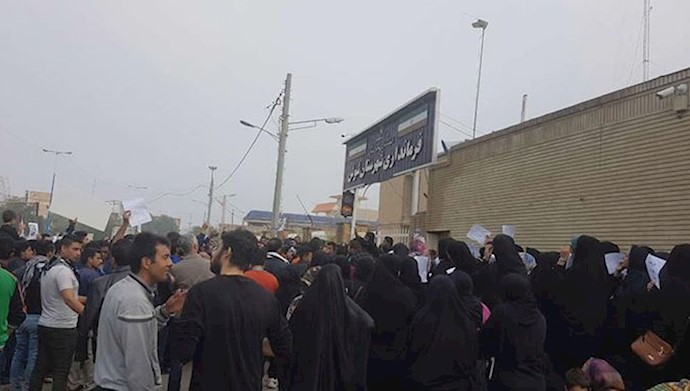Analysis by PMOI/MEK
Iran, Nov. 23, 2018 – In response to widespread demonstrations and support for the Haft Tapeh workers’ cause, the Iranian regime was forced to back down and release all the imprisoned workers on bail, except two of their leaders.
Haft Tapeh Telegram channel, the official channel for Haft Tapeh’s sugar worker association, was first to announce the release of the workers on November 19. It says that all the detained workers, except for four of the workers’ representatives (including Esmail Bakhshi, Mohammad Khanifar, Moslem Armand, and Seyed Hassan Fazeli), have been released. Previously the workers had said that they will continue to protest until all the detainees are set free. Regime officials later released three of the remaining prisoners. Bakhshi and a civil rights activist remain in prison.
As always, when we face such a move by the Iranian regime, it begs the question, does it signal the Iranian regime’s power and stability or its fear of more protests and its weakness.
Haft Tapeh workers’ protests has led to widespread demonstrations, protests, and solidarity acts across the country, including among the steel workers of Ahvaz and university students in Tehran.
In its editorial about the Haft Tapeh worker protests, state-run Resalat newspaper writes: “The protests of sugar factory workers in Shush’s Haft Tapeh have now become a symbol and Haft Tapeh has become a national issue.”
The newspaper warned Rouhani’s government about the consequences of a continued protest and writes: “Considering the sanctions and the government’s weaknesses in the manufacturing sector, we predict that such incidents and protests will increase, and the government and media have to come up with a solution to manage them.”
“If we don’t learn our lesson from this incident and amend our approaches, it can lead to unsolvable difficulties for the country,” the newspaper further warns.
The situation is so bad that state-run media can’t help but acknowledge the workers’ legitimate demands. In another report Resalat writes: “The Haft Tapeh issue isn’t only about the remaining payments of the workers. It also includes things like the lack of transparency in privatization, the workers’ insistence on returning the factory to the public sector, and also corruption and the escape of the factory’s management.”
Shady privatization procedures of publicly owned companies have been a long-standing issue of controversy in Iran. In essence, former public companies are handed out for ridiculously low prices to relatives of high-ranking officials or IRGC members while the whole process is branded as privatization to the public. This is one of the pillars that, over the last three decades, has led to the current kleptocracy and fatally ill economy in Iran.
ILNA, an Iranian state-run news agency, quotes a lawyer and warns about the consequences of a violent crackdown of the workers: “Unfortunately, the harsh living standards of employees has reached a situation where these hard working people of the society can’t afford their basic needs and can’t help but to protest… therefore, a violent response to social protests won’t work at all.”
Sadegh Zibakalam, a so-called moderate who is very much concerned for the future of the Iranian regime, writes in his Twitter feed sarcastically: “For some officials and authorities in Iran, the efficient way to deal with many social problems, is to erase the problem [in the first place]. If students are protesting, school teachers have no option but to strike, the workers of Haft Tapeh sugar factory haven’t received their paychecks for months and are tired to their bones and in similar cases, you can just handle the situation by detaining the leaders.”
If there is one thing that the Iranian people have learned over the past four decades, it is that the Iranian regime only understand the language of perseverance and resistance and will only act properly if it sees the entire regime endangered.
Watching moderates and conservatives advise caution in handling the Haft Tapeh situation is all it takes to understand the precarious pass the Iranian regime finds itself in.
Decades of self-inflicted economic mismanagement and corruption in addition to economic sanctions and high costs for foreign adventures, has alienated even the communities on whose support the Iranian regime has traditionally counted.
In some Friday prayer ceremonies, regulars of the prayer sit with their backs to the prayer leader, who represents the regime, and make one of the most profound political statements possible by saying “back to the enemy face the country.” It’s also very cleverly done because the Iranian regime is tied-hands when it comes to cracking down on these people.
Let’s pray for those real prayers who thus endanger themselves by speaking out against the most corrupt theocracy in the world and hope that the Iranian people will see democracy and freedom soon.





